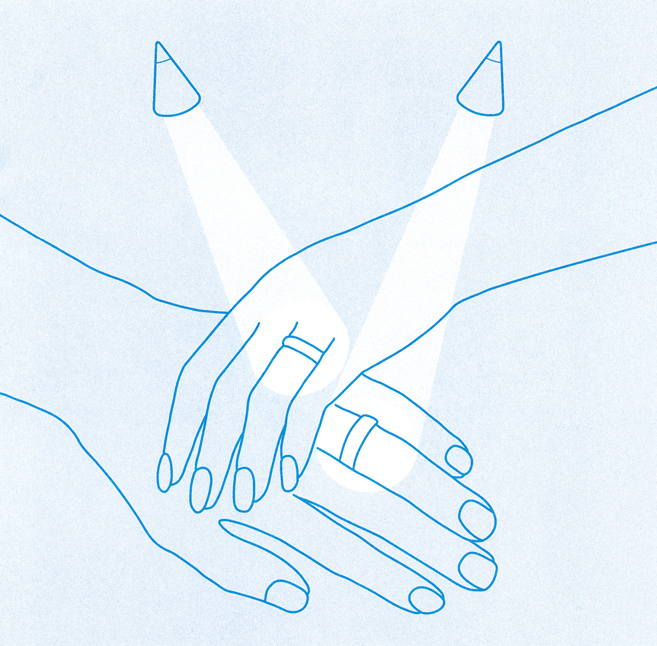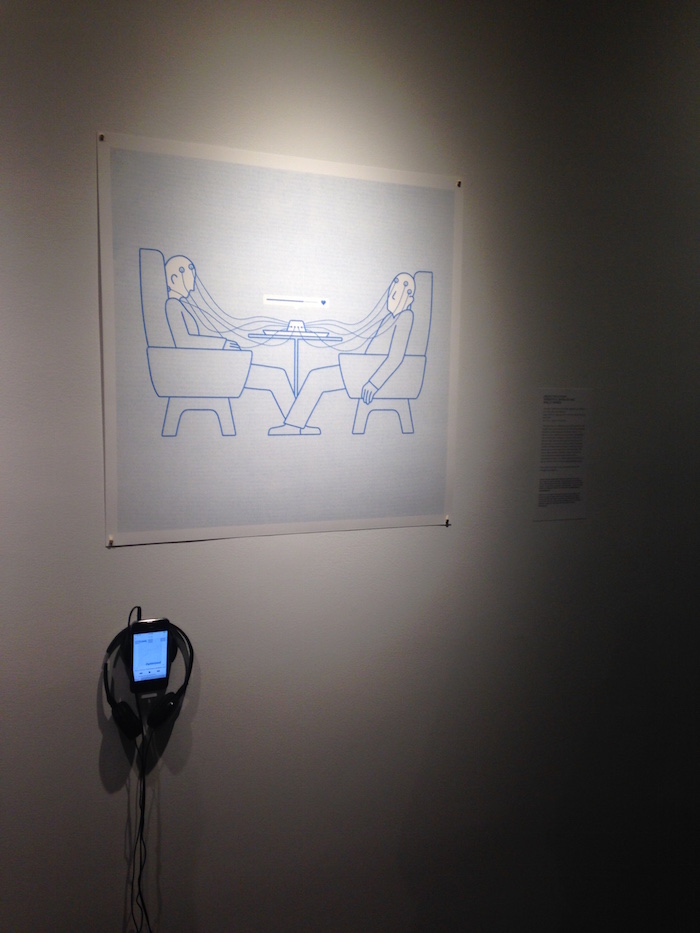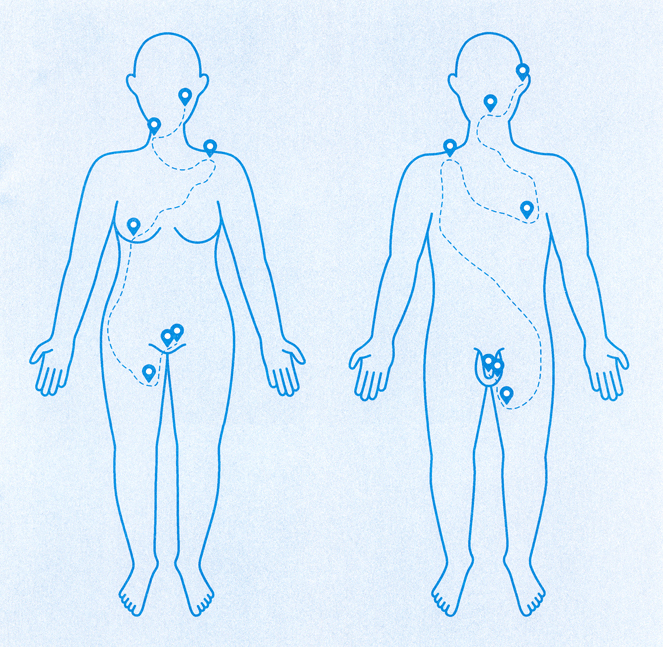The scene is familiar: a fourth-floor gallery, darkened, save for beams of light projected on art objects. Nearby, a film loop depicts young artists seriously contemplating their conceptual distance from a crew of Soviet janitors. The audience is earnest and bespectacled. In the jubilant tones of a Silicon Valley entrepreneur, Shelly Ronen introduces Love, Optimized, a coordinated series of sensors and apps designed to enhance human relations.
Ronen presents herself as the Chief Scientific Officer of Object Solutions, a firm that aims to lead the way in the romance segment of the Internet of Things. Sample products include the micro-drone Ring Finger Spotlight, which illuminates the presence of absence of an engagement ring or wedding band on the finger of a potential partner. The tiny device floats above the user’s ring finger, adapting the quality of light to signal whether the wearer is “flaunt mode, threat mode, or single mode.” Keeping up the high-tech sales patter, Ronen touts the appeal of the NeurAlign, a device which allows singles to sleep through first dates while a computer does the dreary work of assessing sexual and personal compatibility. Should a match be identified, Ronen tells her silent audience, the software prepares a “compelling neural narrative” of love, complete with shared memories and chemical triggers of satisfaction. Ronen is a PhD. candidate at NYU; her design collaborator is the Galveston-based designer Ernesto D. Morales.

Ring Finger Spotlight

Ronen presents herself as the Chief Scientific Officer of Object Solutions, a firm that aims to lead the way in the romance segment of the Internet of Things. Sample products include the micro-drone Ring Finger Spotlight, which illuminates the presence of absence of an engagement ring or wedding band on the finger of a potential partner. The tiny device floats above the user’s ring finger, adapting the quality of light to signal whether the wearer is “flaunt mode, threat mode, or single mode.” Keeping up the high-tech sales patter, Ronen touts the appeal of the NeurAlign, a device which allows singles to sleep through first dates while a computer does the dreary work of assessing sexual and personal compatibility. Should a match be identified, Ronen tells her silent audience, the software prepares a “compelling neural narrative” of love, complete with shared memories and chemical triggers of satisfaction. Ronen is a PhD. candidate at NYU; her design collaborator is the Galveston-based designer Ernesto D. Morales.

Ring Finger Spotlight

The Neuralign installed at MIT's Keller Gallery
Ronen and Morales’ entirely plausible Object Solutions partnership skewers the seriousness with which contemporary consumers hope technology might solve emotional problems. It’s all very tempting to believe that one’s inner life might be made easier by external technologies. After all, we live in a world where IDEO recently peddled a Death app and Shape magazine is urging readers to send in saliva samples for genetically-tailored fitness advice. Why not employ products like those detailed in Love, Optimized?
The Intimatum is a clever extension of the popular Nest smart thermostat. Shaped like a utility meter, the Intimatum is a functioning marital barometer which quantifies and records the expression of affection in a long-term relationship. The Intimatum, like a smoke alarm, alerts users to relationship problems before an awkward and costly professional intervention is needed, advises Ronen. Another hilarious product, TouchTrainer subtly enforces positive physical touches between partners based on biofeedback. Once again, awkward conversation is replaced with invisible digital signals. Sure, it’s fiction, but as Ronen and Morales remind us, once we check our gadgets at the door, we are nothing more or less than the stories we tell ourselves.
Ronen and Morales’ entirely plausible Object Solutions partnership skewers the seriousness with which contemporary consumers hope technology might solve emotional problems. It’s all very tempting to believe that one’s inner life might be made easier by external technologies. After all, we live in a world where IDEO recently peddled a Death app and Shape magazine is urging readers to send in saliva samples for genetically-tailored fitness advice. Why not employ products like those detailed in Love, Optimized?
The Intimatum is a clever extension of the popular Nest smart thermostat. Shaped like a utility meter, the Intimatum is a functioning marital barometer which quantifies and records the expression of affection in a long-term relationship. The Intimatum, like a smoke alarm, alerts users to relationship problems before an awkward and costly professional intervention is needed, advises Ronen. Another hilarious product, TouchTrainer subtly enforces positive physical touches between partners based on biofeedback. Once again, awkward conversation is replaced with invisible digital signals. Sure, it’s fiction, but as Ronen and Morales remind us, once we check our gadgets at the door, we are nothing more or less than the stories we tell ourselves.

Ronen and Morales’ Touch Trainer
Love, Optimized is on view through May 6, 2016, at MIT’s Keller Gallery. The installation is part of The Contingent Space of Work, organized by Nisa Aru and Christianna Bonnin to coincide with the publication of thresholds 44: workspace.
